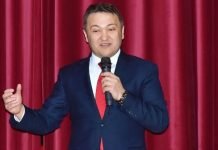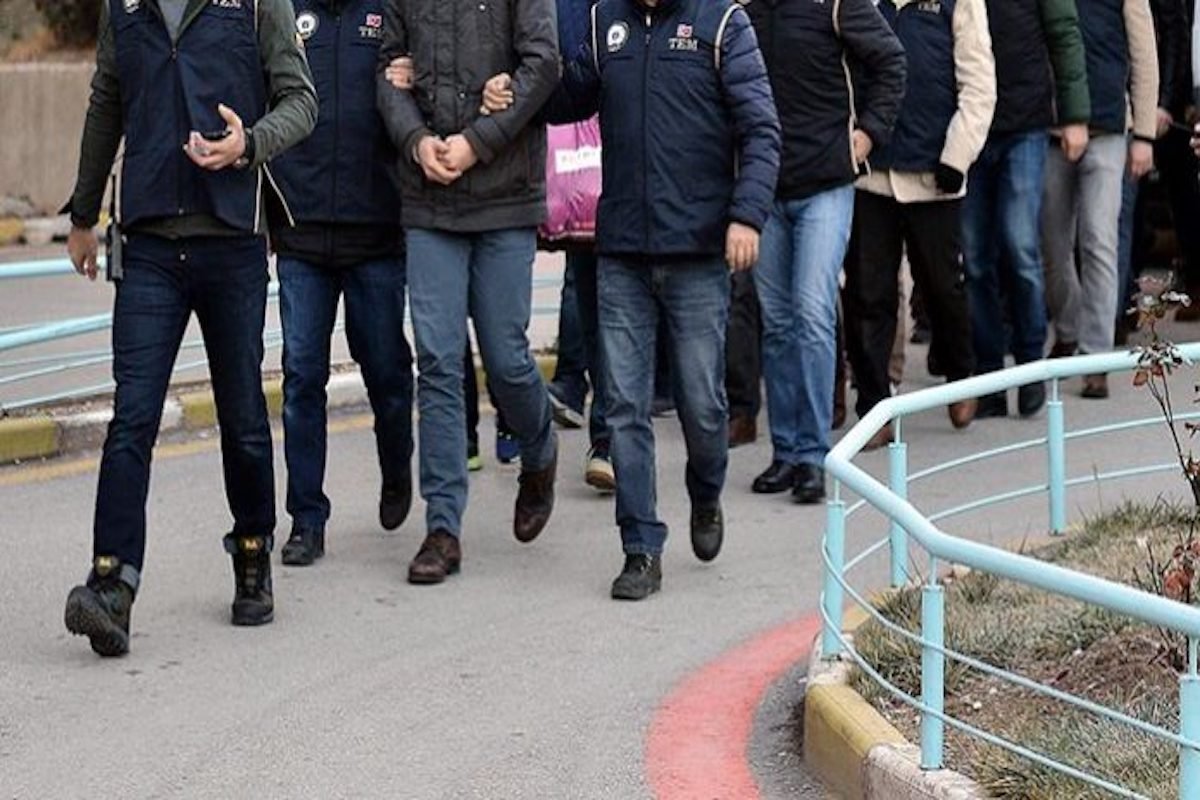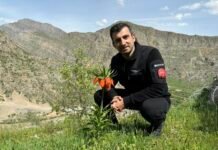The UN Human Rights Council’s Working Group on Arbitrary Detention (UN/WGAD) has stated in a recently released assessment that detention, arrest and conviction in Turkey based on the alleged use of the ByLock mobile phone messaging application is a violation of Articles 19, 21 and 22 of the International Covenant on Civil and Political Rights (ICCPR).
Turkish authorities believe ByLock is a communication tool among alleged followers of the Gülen movement. Tens of thousands of people, including civil servants, police officers, soldiers, businessmen, and even housewives have either been dismissed or arrested for allegedly using ByLock since a controversial coup attempt on July 15, 2016.
UN/WGAD examined an application submitted by the lawyers for Mestan Yayman (51) and released its opinion on the case. Yayman, who used to be vice governor of Antalya province, was suspended on August 29, 2016, and was subsequently dismissed from his job under Statutory Decree No. 672, issued on September 1, 2016, under which about 50,000 people were dismissed.
Yayman was visiting his family in the city of Muğla on September 1, 2016, when he was taken into custody by officers from the Muğla Police Department. The department had reportedly been requested by its counterpart in Antalya to take Yayman into custody on the basis of a warrant issued by the Antalya District Attorney’s Office. However, the Muğla police did not present a warrant when they took him into custody.
While Yayman was being taken into custody, Statutory Decree No. 672 dismissing him from public service was reportedly issued. From Muğla, he was taken to the Antalya Police Station. During his initial detention he was not aware of his sudden dismissal from his job. He was not provided with a reason for his detention until September 7, 2016, and he was not allowed to see anyone during his detention. When he was first taken into custody, he lost his sense of day and night as the lights were left on constantly for several days.
Yayman was reportedly not allowed to see his lawyer for the first five days of his detention. When he was finally allowed to meet with her, they could speak only in the presence of a police officer and in front of a voice recorder.
On September 7, 2016, Yayman was interrogated by a prosecutor and was informed of the reason for his detention. An individual had complained about him, stating that he was a member of the Gülen movement.
Following the interrogation, Yayman was subsequently released on parole, at around 8:30 p.m., as the only “crimes” attributed to him were alleged membership in the movement and the fact that one of his daughters attended a school that was legal, despite being affiliated with the Gülen movement. However, the following day, on September 8, 2016, Yayman was taken into custody again without being given any reason.
On September 11, 2016, Yayman was called for interrogation by another prosecutor who did not wait for Yayman’s lawyer to be present. This time, Yayman was accused of attending religious talks given by members of the Gülen movement up until 2013, based on statements from one individual.
The prosecutor was reportedly very aggressive in his questioning and forced Yayman to supply names and confess to the crime of attending religious talks. At the request of the prosecutor, Yayman was subsequently arrested by Antalya Second Criminal Court of Peace and sent to the Antalya High-Security Prison, where he is still being detained.
In September 2016, Yayman was originally accused of membership in a terrorist organization because of his supposed attendance at religious talks in 2013, at a time when the Gülen movement was popular throughout Turkey and was not recognized as a “terrorist organization,” and that the Turkish Criminal Code does not recognize attending religious talks as a crime. In addition, the “proof” of his affiliation with the Gülen movement was reportedly based on statements from one individual.
On June 2, 2017, 10 months after his arrest, Yayman was again called by a prosecutor and interrogated about his supposed use of ByLock. He was accused of using the ByLock application in December 2014, based on an intelligence report. According to his lawyer, such a report does not constitute proof under the Turkish Code of Criminal Procedure.
Although Yayman is accused of membership in a terrorist organization under Article 314 of the Turkish Criminal Code, the minutes of the preliminary hearing reportedly do not mention this article but rather cite the general reasons for arrest as stipulated in Article 100 of the Turkish Code of Criminal Procedure.
In this context, the lawyer noted that mass arrests and detentions continue to take place following the attempted coup of July 15, 2016. The source reports that at the time of submission, there were 57,000 people in detention in Turkey who were charged with or were waiting to be charged with terrorism.
In September 2017, some 12 months after his arrest, Yayman was presented with the bill of indictment, and his first hearing took place on November 7, 2017. By that time, he had spent 14 months in detention. However, Yayman was not released. He was asked whether he had used the ByLock application. When the judge asked the main witness whether he had seen Yayman at any religious talks organized by the Gülen movement, the witness reportedly replied “No.”
Yayman’s second and last hearing took place on January 3, 2018. He was not informed that this hearing would be his last opportunity to plead. He was simply asked whether he used the ByLock application, to which he replied that he did not. However, as Yayman could not provide evidence to disprove the contents of the Excel file sent by the Turkish intelligence service, and given that the mere existence of people’s names in lists of “ByLock users” compiled by the intelligence service is sufficient to find people guilty of the crime of membership of a terrorist organization, he was found guilty and given a five-year prison sentence.
Moreover, one year was added to the sentence because Yayman was a “vice-governor who represented the executive branch of the State”, and the total of six years was multiplied by 1,5 pursuant to the Turkish Criminal Code, as the Gülen movement is an “armed terrorist organization.” The final sentence of nine years was then reduced by a sixth pursuant to the Turkish Criminal Code, making his final sentence seven years, six months.
The lawyer also submitted to UN/WGAD that the arrest and subsequent detention of Yayman is arbitrary and falls under category I. The court noted that Yayman was included on the Turkish intelligence service’s list of names, the so-called arrest list, but it failed to show the content of his supposed chats on ByLock. Lawyer submitted that ByLock is reportedly said to have over 100,000 users, and it is thus not sufficient to refer to the use of an application in order to declare a person a terrorist and to keep him or her in detention for a period ranging from seven-and-a-half to 22-and-a-half years.
In its opinion, UN/WGAD recalled that it considers a detention to be arbitrary under category I if the detention lacks legal basis. UN/WGAD also took note of the report of the Office of the United Nations High Commissioner on Human Rights (OHCHR) on the impact of the state of emergency on human rights in Turkey, including an update on the Southeast: January–December 2017. In the report OHCHR examined the impact of various decrees issued by the government of Turkey which served as a basis for the dismissal of large numbers of security, military and police officers, teachers, academics, civil servants and health sector personnel. It concluded:
“…the decrees do not establish clear criteria used to assess links of the dismissed individuals to the Gülenist network. As a result, dismissals have been ordered on the basis of a combination of various elements, such as making monetary contributions to the Asya bank and other companies of the ‘Parallel State Organization,’ being a member of a trade union or association linked to the Gülenist network, or using the messenger application ByLock and other encrypted messaging programmes. The dismissals may also be based on reports by the police or secret service about some individuals, analysis of social media contacts, donations, websites visited, or sending children to schools associated with the Gülenist network. Information received from colleagues or neighbors, or subscription to Gülenist periodicals could also be used as criteria for dismissals (para. 65).”
UN/WGAD noted that the case of Yayman appears to follow the pattern described in that report.
The Working Group also underlined that the core of the allegations against Yayman is his alleged alliance with the Gülen movement in 2013, which is said to have manifested itself through his attendance at meetings of the group at that time and his use of the ByLock communications application. However, the government has failed to show any illegal actions in Yayman’s conduct which could be construed as Yayman being a supporter of a criminal organization. His attendance at the talks organized by the Gülen movement in 2013 took place well before this organization was designated as a “terrorist organization” by the Turkish authorities some two years later, and the government has not shown any evidence that Yayman’s attendance led to any criminal actions.
The Working Group also noted the failure on behalf of the government to show how the mere use of such a regular communication application as ByLock by Yayman constituted an illegal criminal activity. While the government has argued that the tribunal requested and obtained the record of the accused’s conversations through the ByLock system, it failed to specify how these conversations could have been construed as criminal activity. Noting the widespread reach of the Gülen movement, as documented in the report of the Council of Europe Commissioner for Human Rights, “it would be rare for a Turkish citizen never to have had any contact or dealings with this movement in one way or another.”
The Working Group also stated that even if Yayman did use the ByLock application, an allegation that he denies, it would have merely constituted an exercise of his right to freedom of opinion and freedom of expression. The Working Group noted that, as stated by the Human Rights Committee in its general comment No. 34 (2011) on the freedoms of opinion and expression, freedom of opinion and freedom of expression are indispensable conditions for the full development of the person. They are essential for any society. They constitute the foundation stone for every free and democratic society (para. 2). No derogations can be made to freedom of opinion simply because it can never become necessary to derogate from it during a state of emergency (para. 5).
The Working Group also noted that freedom of expression includes both the right to seek, receive and impart information and ideas of all kinds regardless of frontiers and the expression and receipt of communications of every form of idea and opinion capable of transmission to others, including political opinions (para. 11). Moreover, article 19 (2) of the Covenant protects all forms of expression and the means of their dissemination, including all forms of audiovisual, electronic and Internet-based modes of expression (para. 12).
In addition, the Working Group noted that the Turkish government cannot claim the restriction to freedom of expression provided for in article 19 (3) of the covenant. When a state party imposes restrictions on the exercise of freedom of expression, the restrictions may not put in jeopardy the right itself (para. 21). Paragraph 3 lays down specific conditions and it is only subject to these conditions that restrictions may be imposed: the restrictions must be “provided by law”; they may only be imposed for one of the purposes set out in subparagraphs (a) and (b) of paragraph 3; and they must conform to the strict tests of necessity and proportionality. Restrictions must be applied only for those purposes for which they were prescribed and must be directly related to the specific need on which they are predicated (para. 4).
Moreover, the Working Group observed that the Turkish government has failed to explain how the restrictions to the freedom of expression imposed upon Yayman comply with the provisions of article 19 (3).
In relation to Yayman’s attendance of the meetings of the Gülen movement in 2013, the Working Group once again observed the failure on behalf of the Turkish Government to specify how mere attendance at peaceful and legitimate meetings breached the right to freedom of peaceful assembly and association and was contrary to articles 21 and 22 of the covenant.
The Working Group therefore concluded that the arrest and detention of Yayman resulted from his exercise of the rights guaranteed under articles 19, 21 and 22 of the covenant, falling under category II.
Given its finding that the deprivation of liberty of Yayman is arbitrary under category II, the Working Group has wished to emphasize that no trial of Yayman should have taken place. However, the trial did take place and the source has submitted that there were severe violations of Yayman’s fair trial rights and that his subsequent detention, therefore, falls under category III.
The Working Group noted the allegation by the lawyer that during Yayman’s trial, the judge denied his request for another expert statement as to whether the ByLock application was found on his telephone. The judge also allegedly denied witnesses on behalf of Yayman the right to be heard. The Turkish government did not address these allegations directly, although it had the opportunity to do so.
At the outset, the Working Group noted that prior to the trial proceedings, Yayman was denied the possibility to meet with his lawyer in private, as a guard with a tape recorder was always present during those meetings. In this respect, the Working Group noted that, as indicated by the Human Rights Committee in its general comment No. 32, the right to communicate with counsel, as enshrined in article 14 (3) (b) of the Covenant, entails the requirement that legal counsels should be able to meet their clients in private and to communicate with the accused in conditions that fully respect the confidentiality of their communications (para. 34). That right was denied to Yayman. Moreover, the meetings with his lawyer were restricted to a mere 20 minutes, a time period so short that it cannot be said to satisfy the requirements of article 14 (3) (b). In addition, once the trial proceedings commenced, Yayman was prevented from speaking to his lawyer before both trial hearings, which is a further violation of article 14 (3) (b) of the covenant.
The Working Group also recalled that, as the Human Rights Committee stated in its general comment No. 32, article 14 (3) (e) of the covenant provides for the right to have witnesses admitted that are relevant for the defence and to be given a proper opportunity to question and challenge witnesses against them at some stage of the proceedings (para. 39). The Working Group thus considered that there have been serious prima facie breaches of Yayman’s rights under article 14 (3) (e) of the covenant as well.
In addition, the Working Group observed that the trial judge made requests for the defence to keep defence short and that the court heard the testimony from a key witness in the absence of both Yayman and his lawyer. The Working Group especially noted that the Turkish Government has failed to provide any reasons as to why the key witness was heard without the presence of Yayman and his lawyer. This is a further serious denial of Yayman’s rights under article14 (3) (e) of the covenant.
The Working Group also noted that the submissions made by the source in relation to the fair trial rights violations in the case of Yayman appear to closely follow a general pattern as evidenced by the Commissioner for Human Rights of the Council of Europe, who noted that “the persons in question [those dismissed under the decrees ordering the dismissals] were not provided with evidence against them and were unable to defend themselves in an adversarial manner in many cases”.
The Working Group, therefore, concluded that there has been partial non-observance of the international norms relating to the right to a fair trial in the case of Yayman, as he was denied the right to adequate time and facilities to prepare for his defense and was prevented from presenting evidence and examining witnesses on his behalf. The Working Group found that this partial non-observance was of such gravity as to give his deprivation of liberty an arbitrary character (category III).
The Working Group also noted that Yayman himself had not previously been prosecuted due to his links with the Gülen movement or with any other religious organization. However, the Working Group is mindful of a large number of cases being brought before it in relation to Turkey. It is also mindful of the pattern that these cases follow, which corresponds to the pattern documented in the above-mentioned reports of OHCHR and the Commissioner for Human Rights of the Council of Europe.
The Working Group stated that it is aware that a large number of individuals were arrested following the attempted coup in July 2016. On August 19, 2016, the Working Group, in association with other United Nations human rights experts, sent a joint urgent appeal and subsequently issued a press release on the same date. The experts noted that, since the attempted coup on July 15, and in particular since the declaration of a state of emergency on July 20, Turkish society had seen an escalation of detentions and purges, particularly in the education, media, military and justice sectors. In addition, allegations of torture and poor detention conditions had been raised following legislative provisions that enabled wide and indiscriminate administrative powers that affected core human rights. The experts, while understanding the sense of crisis in Turkey, urged the government to uphold its obligations under international human rights law, even during the declared emergency following the attempted coup.
Furthermore, the Working Group noted that the present case is but one of a number of cases concerning individuals with alleged links to the Gülen movement that have come before it in the past 18 months. In all these cases, the connection between the individuals concerned and the Gülen movement has not been one of active membership and support of the group and its criminal activities but rather, as described by the Council of Europe Commissioner for Human Rights, activities of “those who were sympathizers or supporters of, or members of legally established entities affiliated with the movement, without being aware of its readiness to engage in violence”.
In all those cases, the Working Group has found the detention of the individuals concerned to be arbitrary and it thus appears to the Working Group that a pattern is emerging whereby those who have been linked to the group are being targeted, despite never having been active members of the group or supporters of its criminal activities. The Working Group therefore considers that the detention of Yayman was arbitrary since it constitutes discrimination on the basis of political or other opinion or status and falls under category V.
The Working Group also expressed its wishes to reiterate the position of the Council of Europe Commissioner for Human Rights on the need for Turkey to urgently revert “to ordinary procedures and safeguards, by ending the state of emergency as soon as possible. Until then, the authorities should start rolling back the deviations from such procedures and safeguards as quickly as possible, through a nuanced, sector-by-sector and case-by-case approach.”
The Working Group also stated that it would welcome the opportunity to conduct a country visit to Turkey. Given that a significant period of time has passed since its last visit in October 2006, the Working Group considered that it is an appropriate time to conduct another visit.
In the light of the foregoing, the Working Group rendered the following opinion: The deprivation of liberty of Mestan Yayman, being in contravention of articles 3, 9, 10, 19 and 20 of the Universal Declaration of Human Rights and of articles 9, 14, 19, 21, 22 and 26 of the International Covenant on Civil and Political Rights, is arbitrary and falls within categories I, II, III and V.
The Working Group requested the government of Turkey to take the steps necessary to remedy the situation of Yayman without delay and bring it into conformity with the relevant international norms, including those set out in the Universal Declaration of Human Rights and the International Covenant on Civil and Political Rights.
The Working Group considered that, taking into account all the circumstances of the case, the appropriate remedy would be to release Yayman immediately and accord him an enforceable right to compensation and other reparations, in accordance with international law.
Hundreds of thousands of people in Turkey have been the subject of legal proceedings in the last two years on charges of membership in the Gülen movement since a coup attempt on July 15, 2016, a Turkish Justice Ministry official told a symposium on July 19, 2018.
“Legal proceedings have been carried out against 445,000 members of this organization,” Turkey’s pro-government Islamist news agency İLKHA quoted Turkish Justice Ministry Deputy Undersecretary Ömer Faruk Aydıner as saying.
Turkey survived a controversial military coup attempt on July 15, 2016, that killed 249 people. Immediately after the putsch, the Justice and Development Party (AKP) government along with President Recep Tayyip Erdoğan pinned the blame on the Gülen movement.
Fethullah Gülen, who inspired the movement, strongly denied having any role in the failed coup and called for an international investigation into it, but President Erdoğan — calling the coup attempt “a gift from God” — and the government initiated a widespread purge aimed at cleansing sympathizers of the movement from within state institutions, dehumanizing its popular figures and putting them in custody.
Turkey has suspended or dismissed about 170,000 judges, teachers, police and civil servants since July 15, 2016. On December 13, 2017, the Justice Ministry announced that 169,013 people have been the subject of legal proceedings on coup charges since the failed coup.
Turkish Interior Minister Süleyman Soylu announced on April 18, 2018, that the Turkish government had jailed 77,081 people between July 15, 2016, and April 11, 2018, over alleged links to the Gülen movement.

















[…] http://stockholmcf.org/un-anel-to-turkish-govt-prosecution-based-on-alleged-use-of-bylock-violates-… […]